Barbara Schrock Belsly
The Forgotten Wife and Motherby Donna Schrock Birkey
Originally published in the Winter 2011 (Vol. XXXVIII • No. 4)
Illinois Mennonite Heritage Quarterly (http://www.imhgs.org) – (Used with permission of original publisher)
The Belsly family has known very little about Barbara Schrock as Joseph Belsly’s first wife; in fact, Barbara is the least known of her Schrock siblings as no primary documents have been found for her. She was probably born in France about 1815, possibly in the Saarebourg area of Moselle, Lorraine. Barbara is not listed along with her siblings on the quarterly arrival document for Baltimore, but at some point she also emigrated to America and lived for a while in Butler County, Ohio, where her brothers and sister lived at the time. Barbara married Joseph Belsly in Butler County, but she most surely knew the Belsly (Pelsy) family in France. However, just as her birth record has not been found to date, neither has her marriage record.
The couple eventually moved to Woodford County to Joseph’s farm north of Metamora, Illinois. Their first and only child, Christian, was born there in July 1835. Sometime in 1836, Barbara died at about 21 years of age. She was buried near their family farm.
Joseph Belsly was born 28 May 1802 (or 28 Mar 1802) at Hof Hellocourt, a farm about seven miles west from Rhodes in Moselle, France. He was known as “Joe de la Rouge,” or Red Joe, because of his distinctive red hair. About Red Joe’s emigration to America in 1828* at age 26, French cousin, Pierre Pelsy, observed, “It is told he took along a bag of flour, a sack of dried fruit and a belt in which gold coins were hidden. He must have been a very courageous and adventuresome young man.”
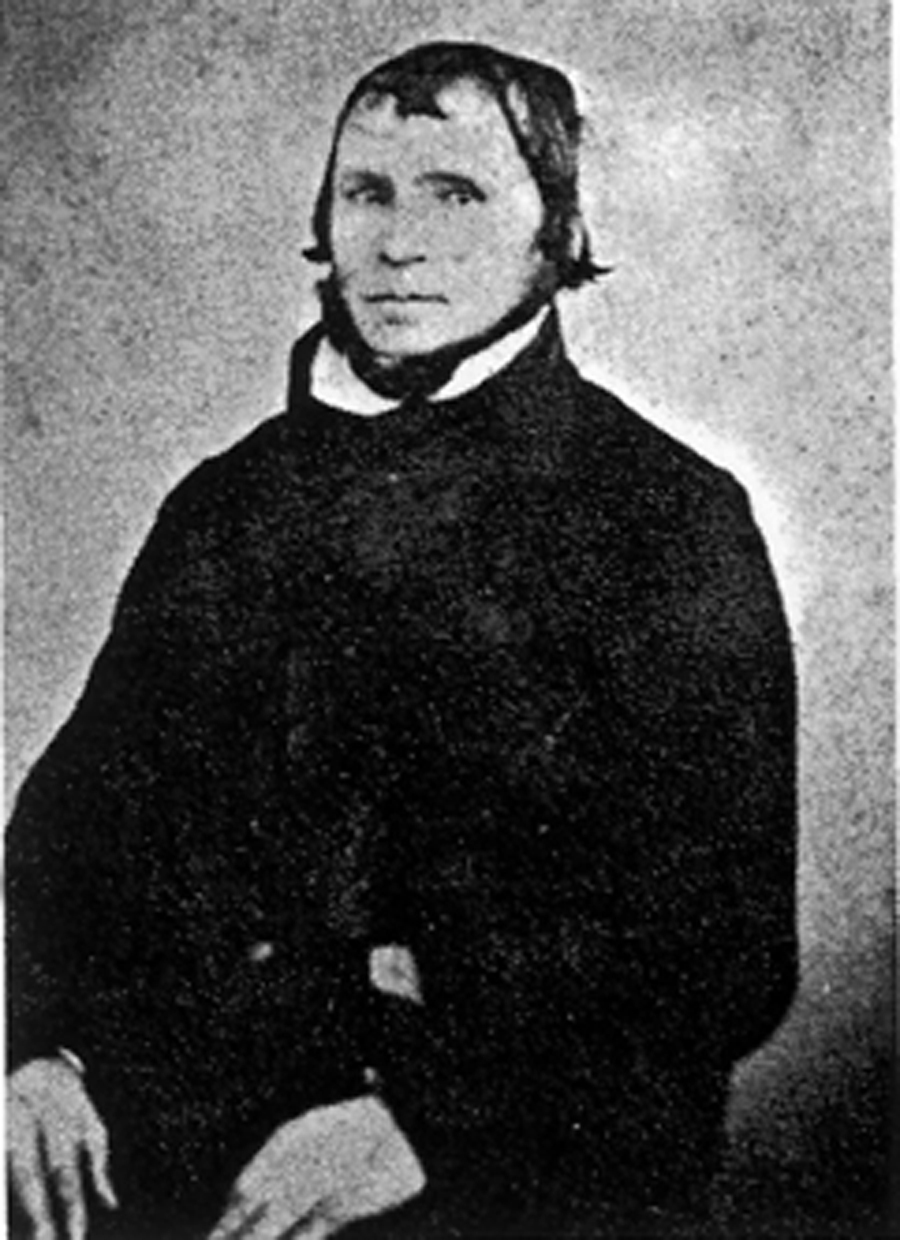
“Joe de la Rouge” – “Red Joe” Belsly
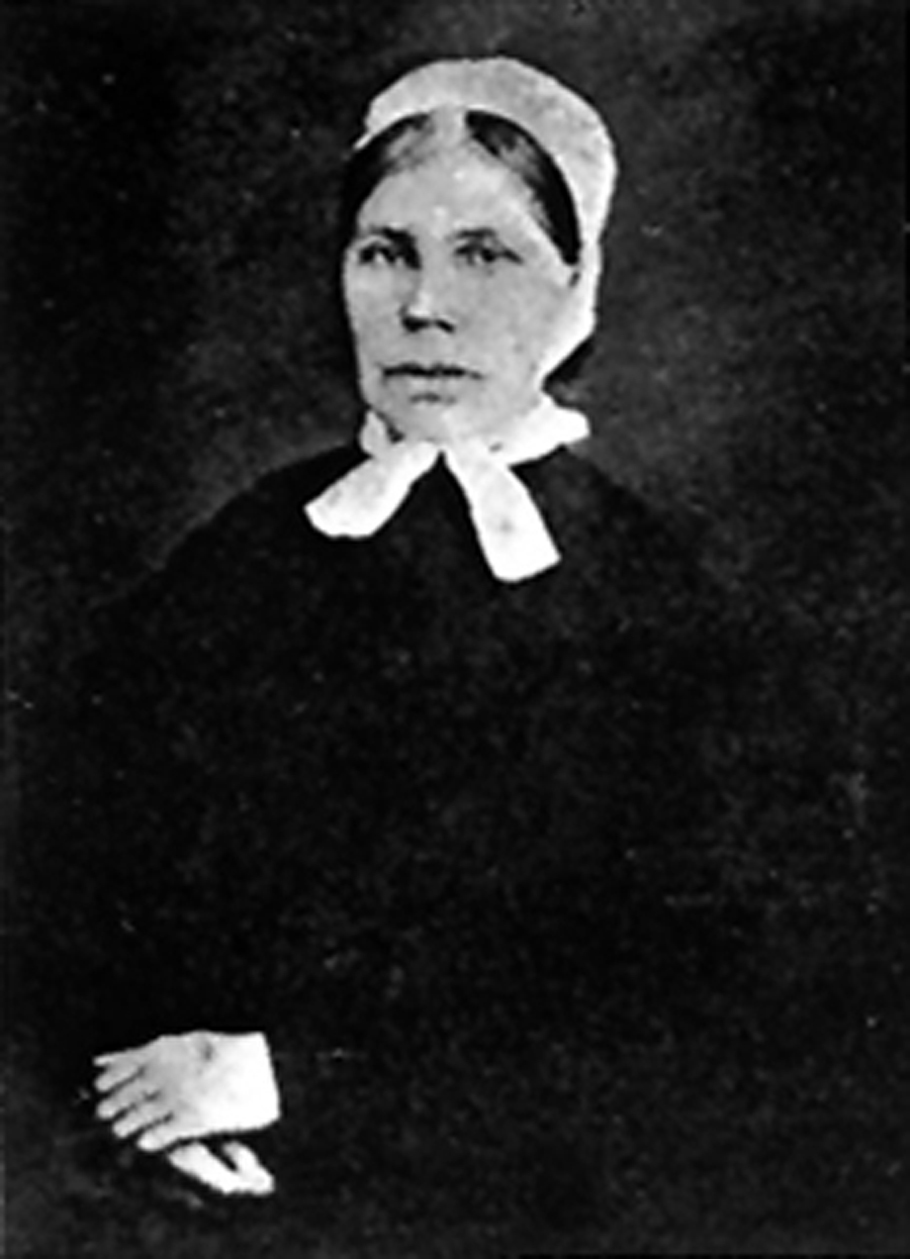
Barbara Engel Belsly, Red Joe’s Second Wife
After arriving in America, Red Joe went first to Ohio where he found employment. In about 1830/31 he moved to Illinois where the government was selling land for $1.25 per acre. According to History of Woodford County “…Mr. Belsley made claim to a tract on Partridge Creek, later [in 1833] sold to Joseph Johnson, and he settled then in Worth [Township] close to the Partridge line.” Partridge Township was at the time a wild, desolate, sparsely settled region. Red Joe was part of the Partridge Township Amish settlement. In 1832 he purchased a 240-acre tract of heavily wooded land on higher ground north of Metamora and built a French-style barn on the property.
In 1840 after Barbara Schrock’s death, Red Joe married another Barbara—Barbara Engel (1803-1881), daughter of Bishop Christian Engel and Barbe Brunner. They had no children. Twelve years after his marriage to Barbara Engel, Red Joe built a red brick farmhouse that was later painted white. The bricks used for building the house were made from clay dug up from Red Joe’s land. The house was fronted by an elevated buggy landing and fence. This farm has been in the Belsly family since the day Joseph purchased it and is considered to be the oldest one-family farm in the state of Illinois.
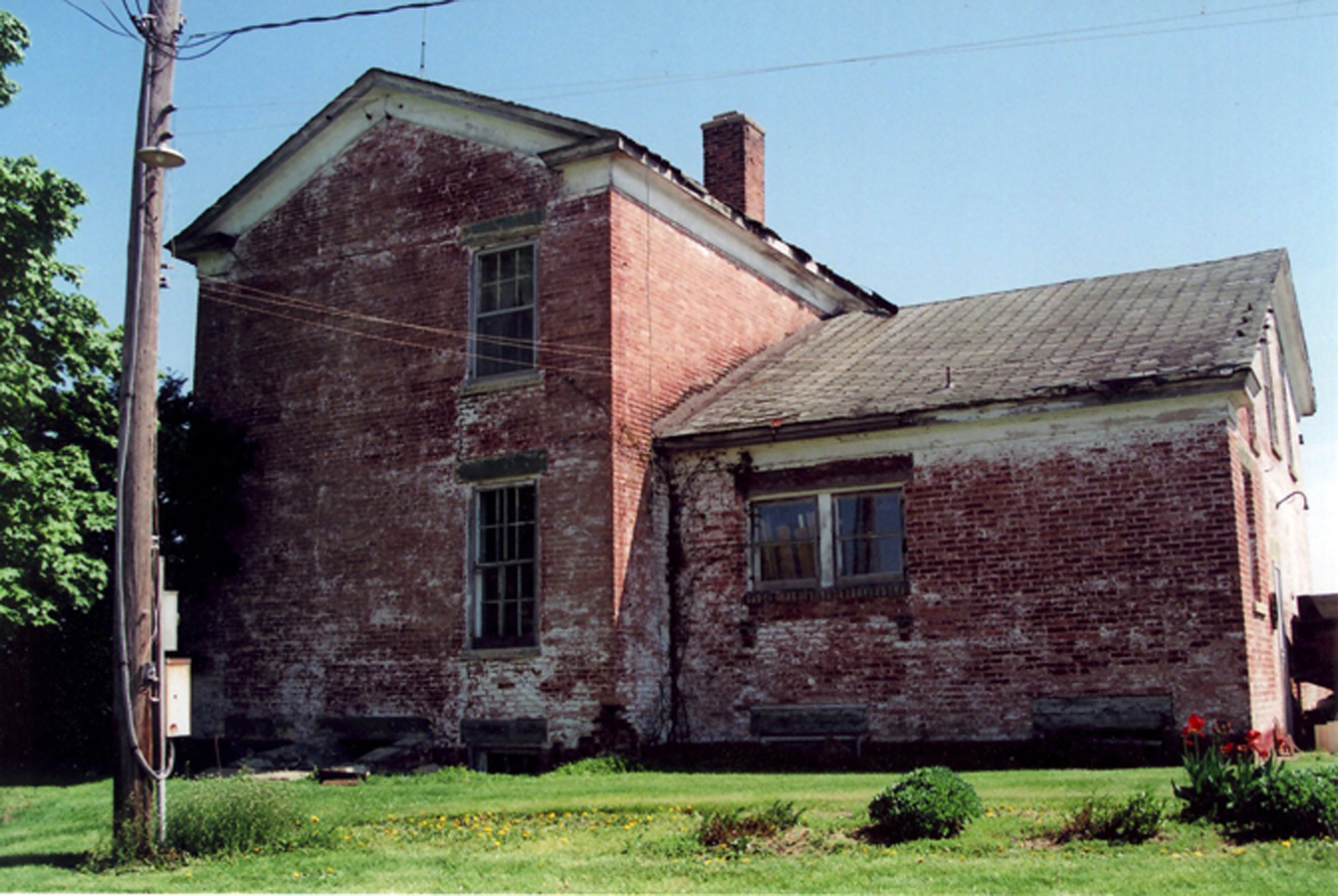
The farmhouse Red Joe constructed with red bricks made from clay from his property. It is considered to be the oldest one-family farm in Illinois
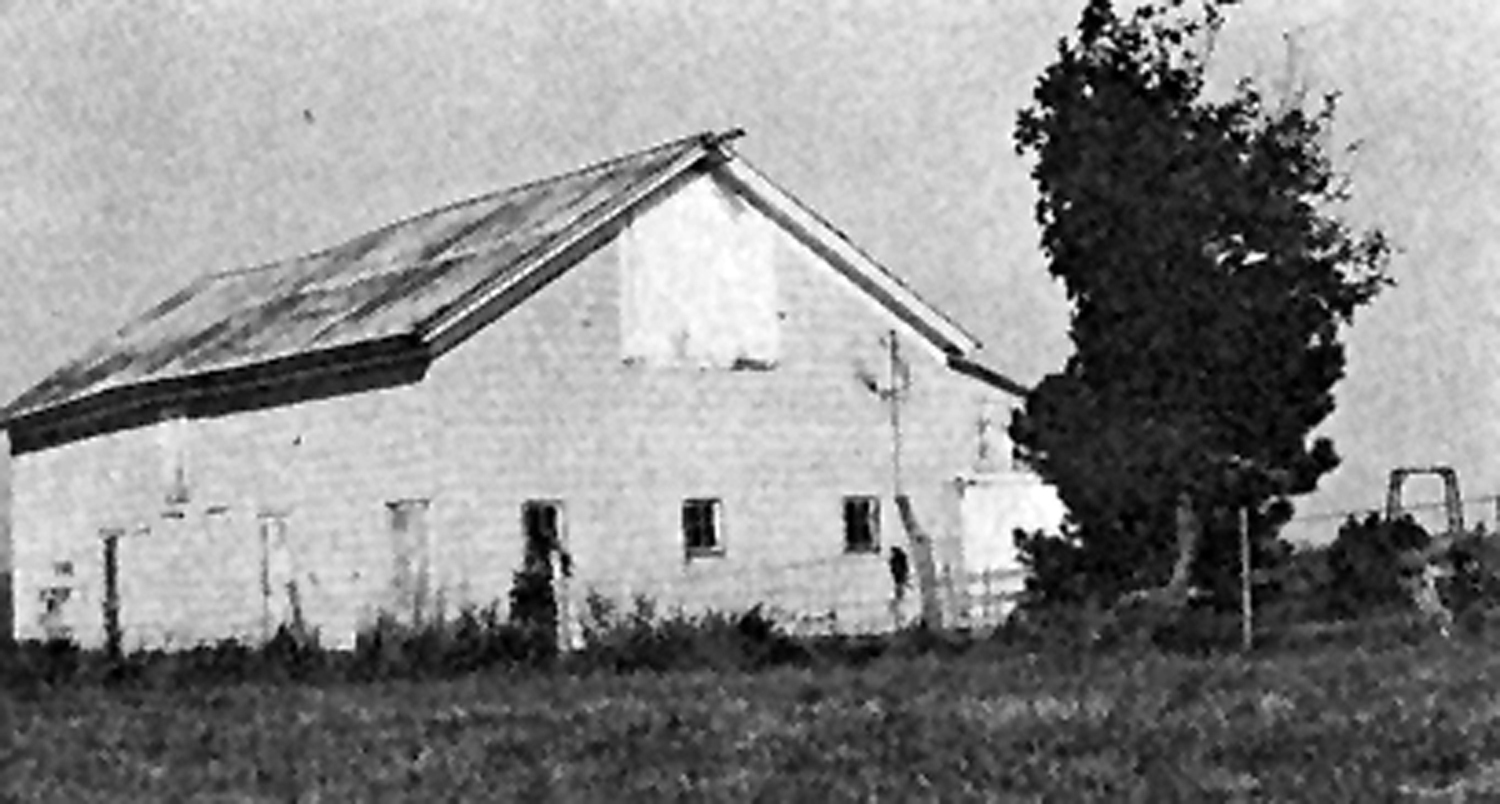
The French-style Barn Built by Red Joe Belsly
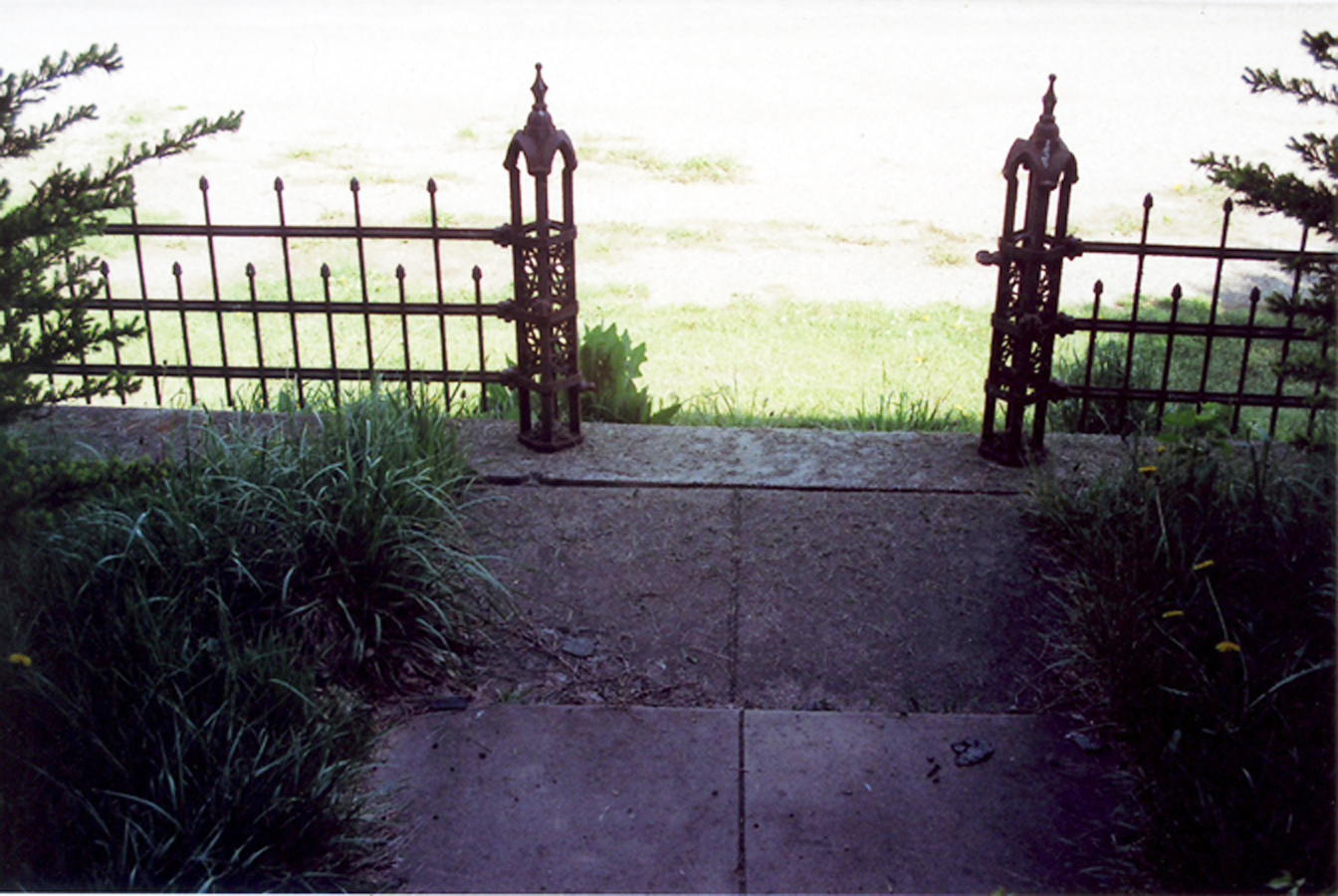
The elevated buggy landing and fence
Red Joe was a very successful farmer and was known to have been one of the wealthiest persons in the area. He was successful growing clover on his land, something that had not been done before in that part of the country. As his assets increased he kept buying more land. At the time of his death, he was the owner of 15 parcels of land ranging from 40 acres to 320 acres. His son, Christian, never learned how to handle finances and as a result his father, Joseph, left his estate to Christian’s children. He was able to leave farms in life estates to each of his grandchildren. His namesake and favorite grandson, Joseph (1861-1937) received the homestead on Lourdes Road. **
When Red Joe died on Christmas Eve 1872 at age 70 of what was then called dropsy, or abnormal swelling of the tissues, his nine-page will divided his sizable fortune into 33 units that took six years to disperse through the probate process. He chose to leave his widow $2,000 but only 80 of his 2,000 acres. Son Christian, who expected a life of leisure, was left only 120 acres and a payment of $150 a year for 20 years. The family farm on Lourdes Road passed more or less intact to the namesake grandchild.
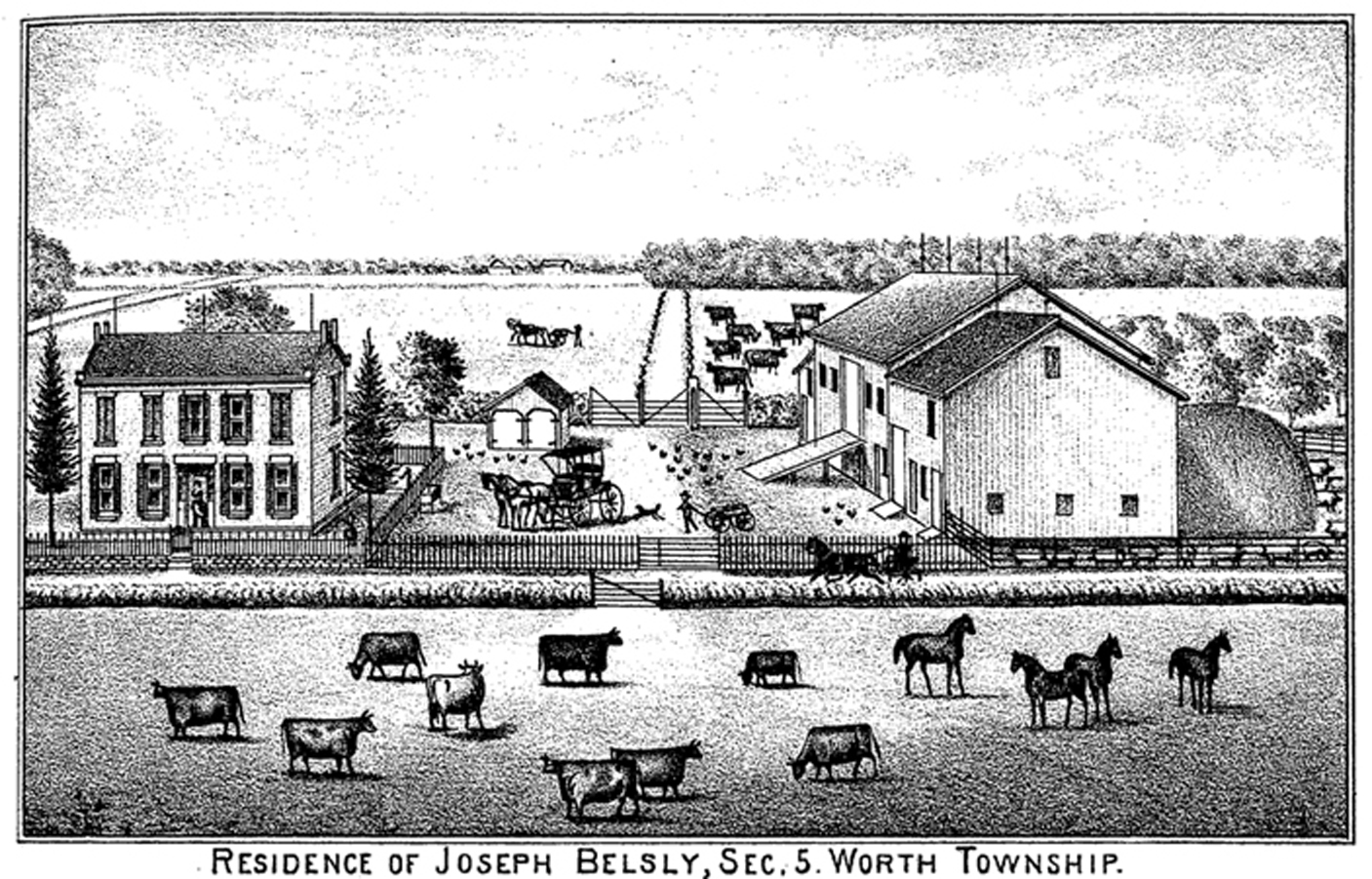
Illustration from Portrait and Biographical Album of Woodford County, Illinois
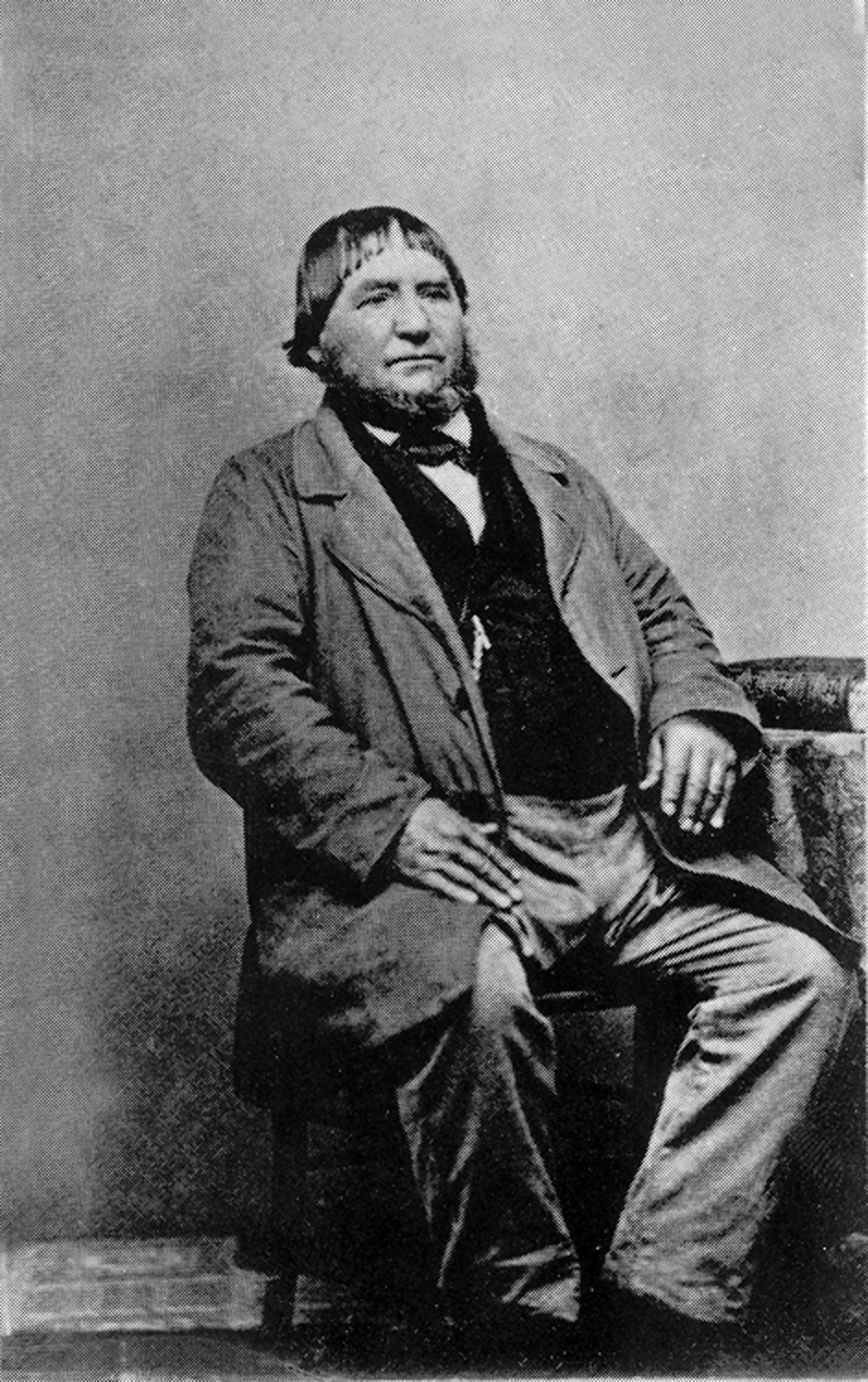
Red Joe Belsly in his later years
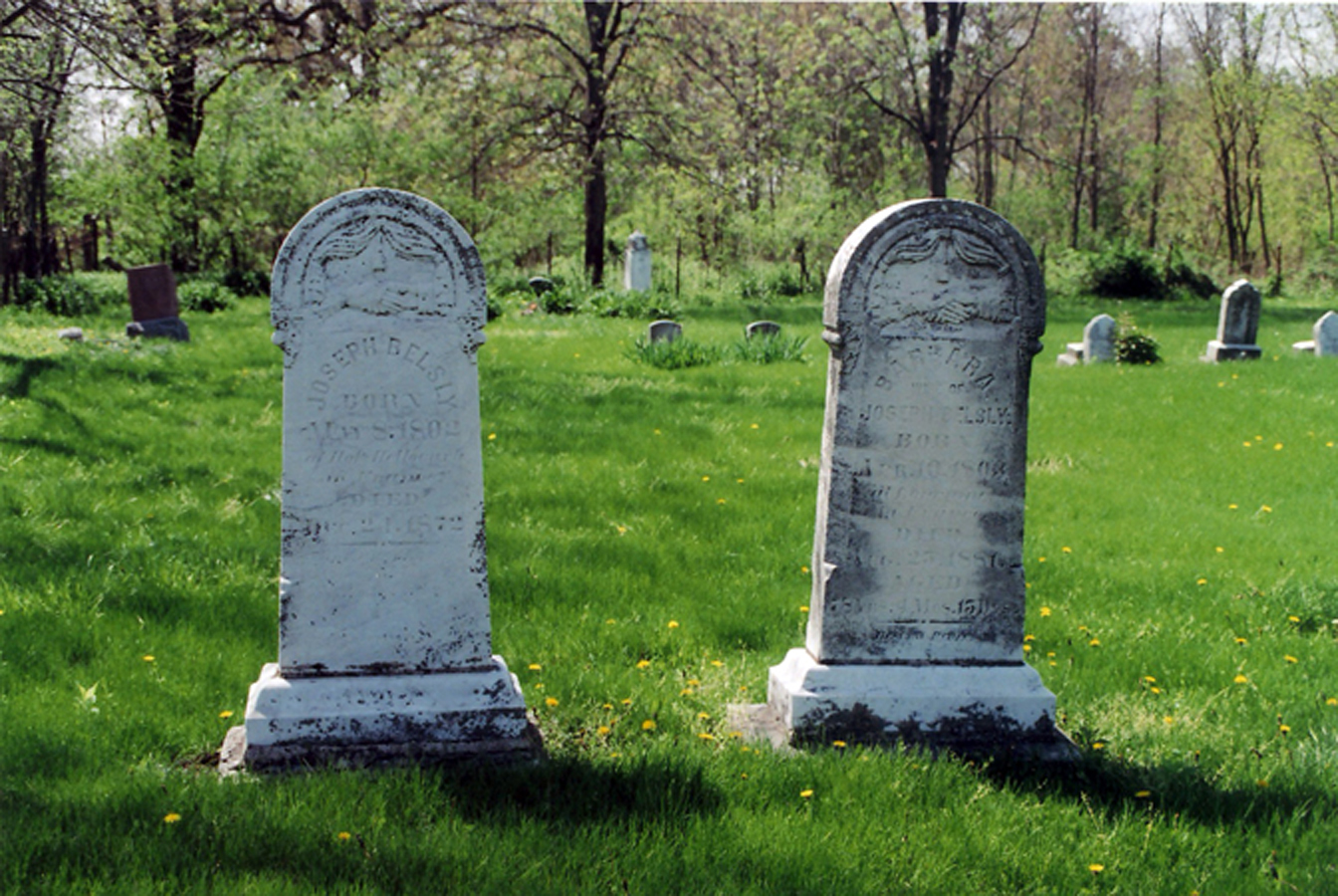
The graves of Red Joe and his wives in the family cemetery on Lourdes Road in rural Metamora. Both Barbara’s were buried in the same grave, but only Barbara Engel is named on the stone.
The Feb 1873 Herald of Truth contained Red Joe’s obituary: In Woodford County, Ill., December, 24th 1872, of dropsy, JOSEPH BALSLY, snr., aged 70 years, 6 months, and 26 days. He leaves a bereaved wife and one son to mourn their loss. Services by Jacob Unzicker, Christian Esh, and Peter Gingerich. Peace to his ashes.
Burial was in a cemetery near his farm. Red Joe’s widow, Barbara Engel, lived until 1881 and was also buried near their farm. At some time after the deaths, the graves of all three were moved to a different location—in a family cemetery near the homestead on Lourdes Road. Both wives were buried in the same grave, but the stone only names Barbara Engel. This could be the reason why Red Joe’s first wife, Barbara Schrock, was all but forgotten by the family.
Red Joe distrusted his son Christian’s easy nature. Relatives considered the only child to be spoiled. But Christian did help his father on the farm. They loaded produce on wagons and hauled it to Chicago. On the return trip, they brought back supplies or equipment for the farming operations.
Christian more than likely found his prospective wife during a visit to his uncle Peter Schrock in Butler County. Mary lived in the next house on Salzman Road. The marriage ceremony was conducted by minister Nicholas Augspurger at Trenton in Butler County on Nov. 18, 1856. Red Joe was 21 and his new wife 19.
Researcher Joseph Staker tells us who Christian’s wife was: “The wife that son Christian Belsly found in Butler County was his second cousin Mary Schertz, who was born in Butler County in 1837. She was the oldest of three daughters of John Schertz and Catherine Engel, who lived on Salzman Road next to Peter Schrock. And when Johannes Schrock left Ohio for Illinois, John Schertz bought his land. John was also the business partner of John Staker, and his daughters were trained in business and accounting. No doubt Mary Schertz made an appropriate partner for the errant son of Red Joe Belsly. Red Joe [had shown] his displeasure with his son by declining to present the groom with the customary gift of acreage from the family farm. Christian was forced to make his own living.”
Christian and Mary, first settled for a short time on a farm at Crow Creek in Marshall County, then lived on a farm in Spring Bay for two years. Finally, Christian purchased land near Deer Creek, IL, where he and his wife lived and raised their family. Mary was a slightly built lady, loved and respected in the community. Her obituary included the following: “In recognition of a quiet, unassuming Christian life, the following simple verse will apply most appropriately—Her hands were filled with deeds of charity, the Golden Keys that open the palace of Eternity.
According to the remembrances of several grandchildren, “they attended the early East Washington Mennonite Church. They raised nine children…When the first son (second grandchild) was born Grandpa Red Joe drove from his homestead in north Worth Township to see his first grandson. The parents had already chosen a name for the boy, but Grandpa Red Joe said ‘his name is Joseph,’ so that is what he was named. It was that first grandson who later inherited the Red Joe homestead and when grandson Joseph married Ida Foster they moved to that homestead where they raised their family.”
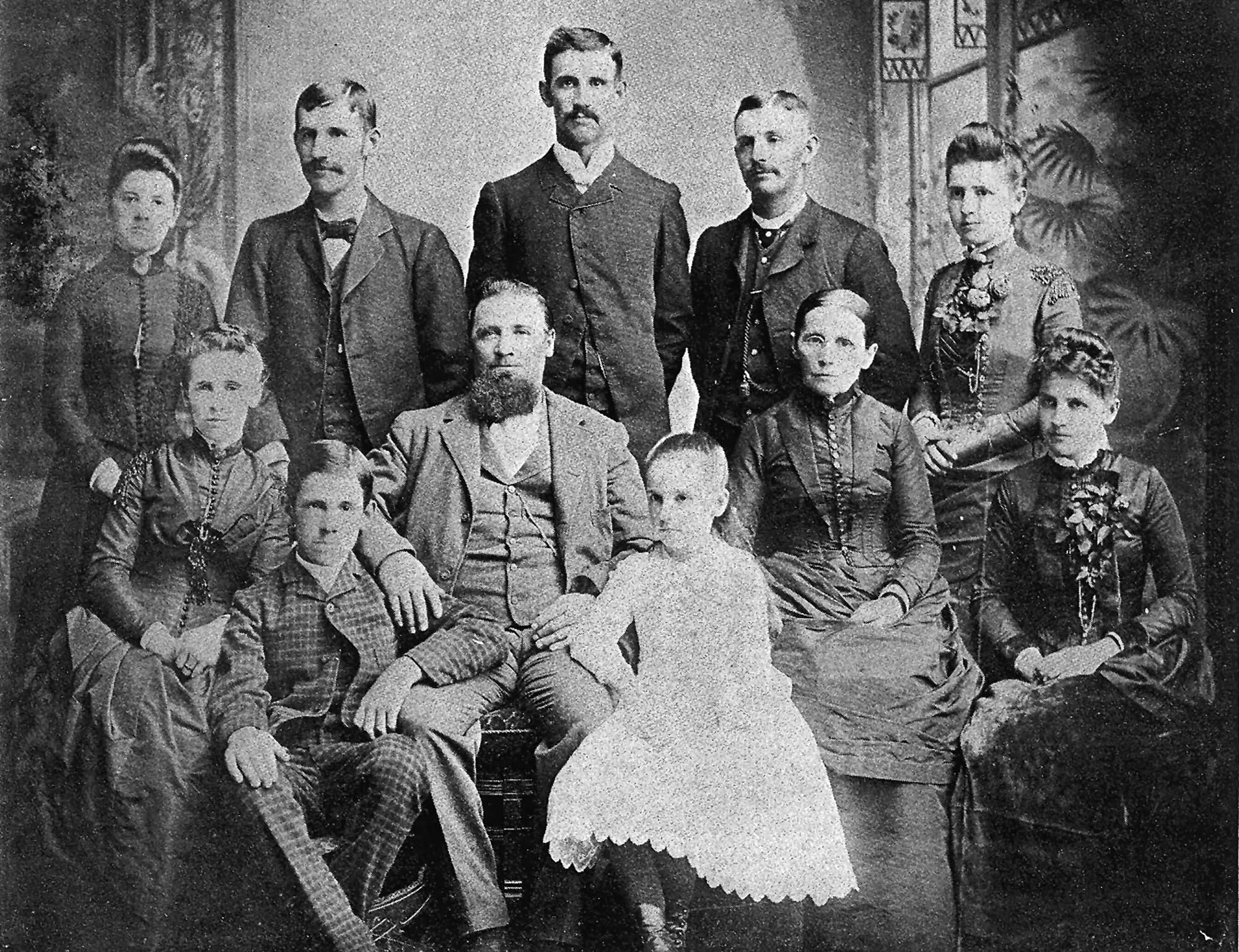
The family of Christian and Mary Belsly
Grandson Louis Phillips tells some interesting stories about the life of Christian.
” Chris soon began to realize that from the possessions his father had he wouldn’t have to work and at the early age of eighteen he decided that a life of leisure was what he should have. “Red Joe” would have Chris get up every morning and run down to the barn and pump water for the livestock. “Red Joe” thought it would make Chris healthy and hardy but it only served to make him rebellious against family discipline and to develops theory of independence.
“Early in his married life Chris trained Mary as few wives were trained. His clothes were always laid out on the bed ready for Chris to put on. If he wanted something at the table he didn’t ask for it. He simply held his knife straight up and Mary would know what he wanted and see that it was started on the way to him. There was no idle chatter at the table when Chris was there but when he was finished with his meals helot up and went into the bedroom–or the hammock in the summertime–for a nap. Mary and all the children loved Chris but he ruled with an iron hand.
“‘Deer Creek, which was Chris’ home town, was quite a baseball town. They had a local team which would play neighboring teams and would take on traveling teams. When this happened they would usually bolster the team with some extra good players from other towns and would often bring out special ones from Peoria if they thought the competition warranted it. The management of the Deer Creek team lined up a game with the Kansas City Gems which was an organization made up of Negro players. For this game the local management secured the talent of some exceptional players and though they didn’t expect to win they didn’t think they would be beaten too badly. The Negro boys were players who were capable of defeating almost any team that most towns would put on the field. Chris, true sportsman that he was, made a trip over to Danvers where the team was playing the day before their game at Deer Creek, saw the manager, and for forty dollars had the assurance that the Gems would lose the game. Then he hurried back to Deer Creek and had no trouble in placing two hundred dollars at even money that Deer Creek would win. That looked fine for Chris except that the Gems won. Since the manager left town before the game was over Chris never did find out how that came about, but it was rumored that another true sportsman had given the manager fifty dollars to win.”
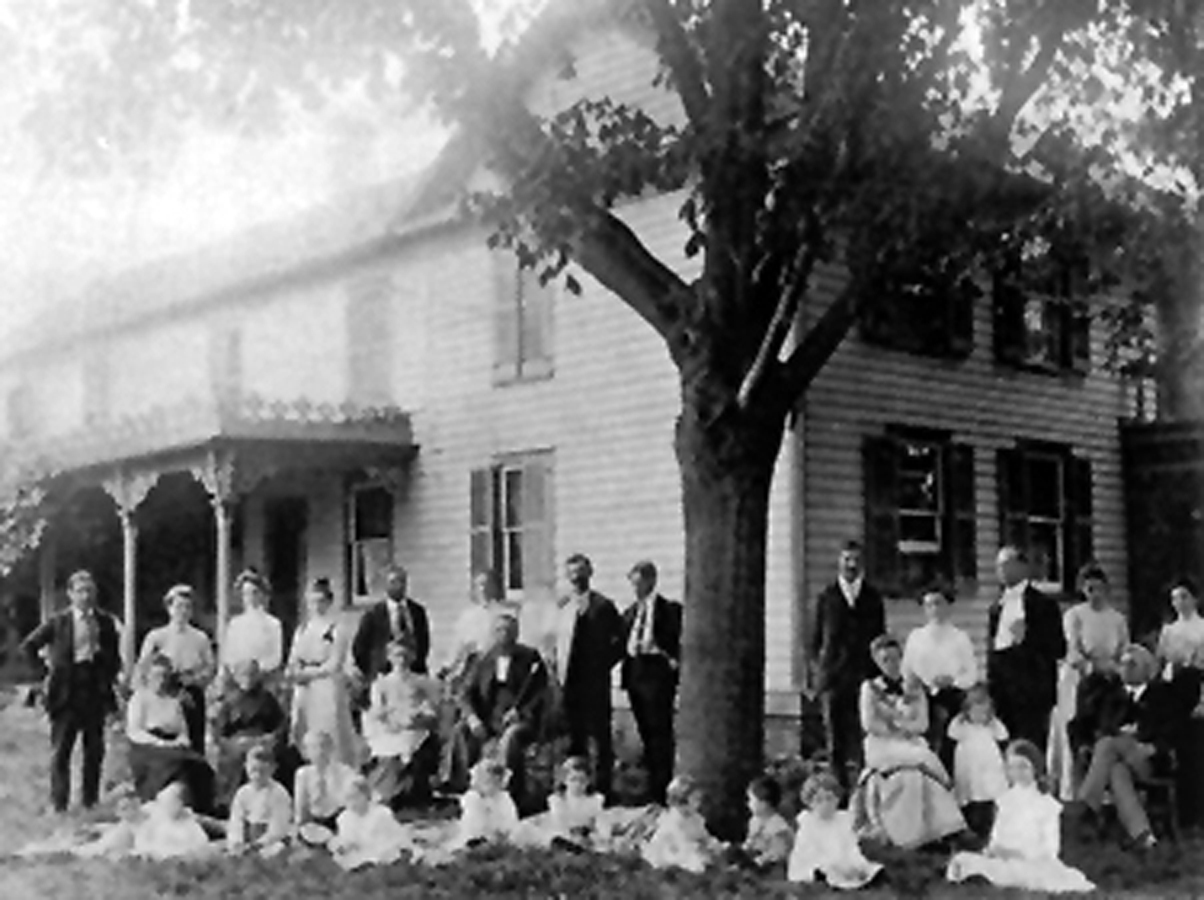
Christian Belsly’s 67th birthday party
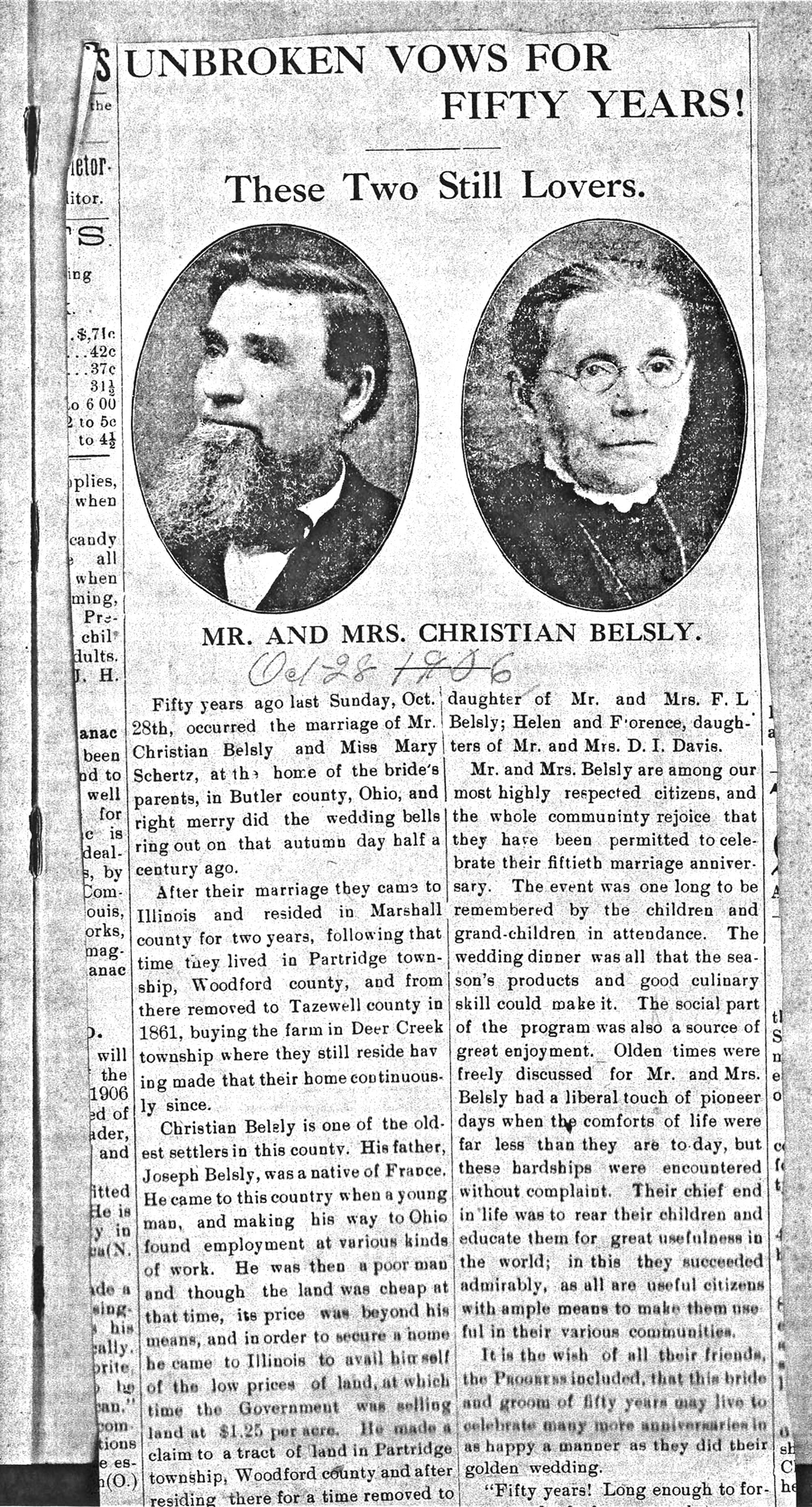
Item in “The Progress” about Christian and Mary Belsly’s 50th Anniversary
In 1906 he and Mary celebrated their 50th wedding anniversary. Again The Progress describes the celebration: “Unbroken Vows for Fifty Years! These Two Still Lovers.”
“….Mr. and Mrs. Belsly are among our most highly respected citizens, and the whole community rejoice that they have been permitted to celebrate their fiftieth marriage anniversary. The event was one long to be remembered by the children and grand children in attendance. The wedding dinner was all that the season’s products and good culinary skill could make it. The social part of the program was also a source of great enjoyment. Olden times were freely discussed for Mr. and Mrs. Belsly had a liberal touch of pioneer days when the comforts of life were far less than they are today, but these hardships were encountered without complaint. Their chief end in life was to rear their children and educate them for great usefulness in the world; in this, they succeeded admirable, as all are useful citizens with ample means to make them useful in their various communities.”
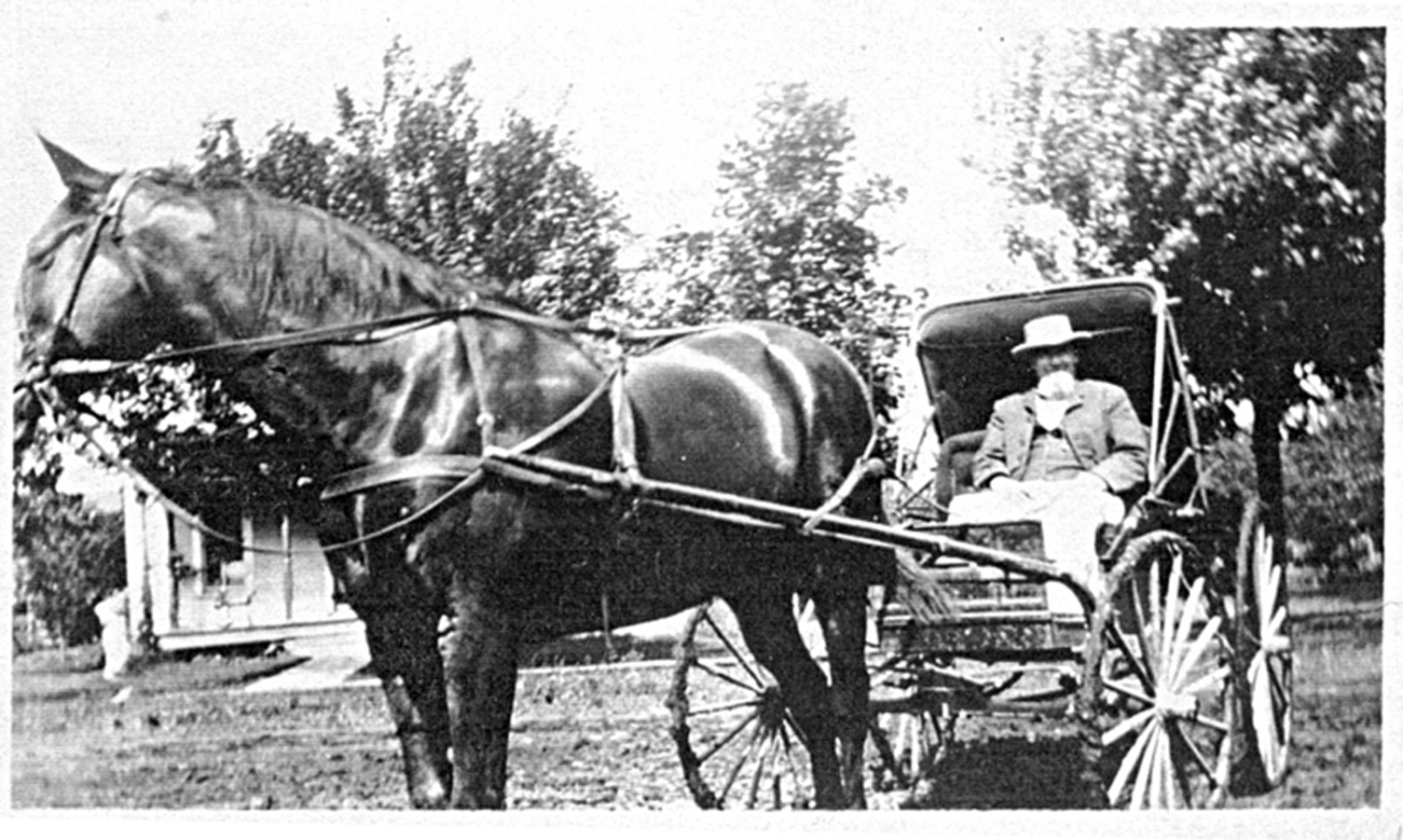
Christian Belsly with one of his “foxy” horses
Christian liked fine horses. His granddaughter Verna Belsly observed, “He liked to drive foxy horses.” It was said his workhorses were always strong and good pullers and many a time Christian would bet a little on the loads they could pull. As Christian was a member of the school board he talked to school children whenever he had a chance. The story was that when he and his father were driving a load of produce to Chicago one early spring when the roads were broken up they came to a sign that read: TAKE CARE OF THE RUT YOU CHOOSE, YOU WILL BE IN IT FOR THE NEXT 50 MILES. He would refer to that and then continue, “Would that we can say to every young man and woman: Take care of the path you choose—you will be in it for the next 50 years. Choose a path of vision and courage with a goal you have to reach for and your life will be a pleasant and profitable adventure.”
In the end, Christian and his wife ran a prosperous farm and raised nine children (three others did not reach maturity). He served as a school director and commissioner of highways in Deer Creek and was highly regarded in his community. Mary died in 1911 at the age of 74 and Christian died in 1917 at age 81. They are buried in Mt. Zion Cemetery at Deer Creek.
Barbara Schrock Belsly left the family picture not long after entering it, but her contribution of producing the one heir was gigantic. From her son came many generations of Belsly families populating the Illinois countryside and beyond.
Footnotes
* The Belsley-Sauder Genealogy states that ‘Red Joe’ emigrated in 1820, worked in Ohio, moved to Illinois in 1825, and bought land in Partridge (then part of Tazewell County) in 1830. The early dates are not substantiated by other sources.
** An unpublished autobiographical manuscript was brought to our attention, written by Verna Belsly, great grandchild of Red Joe and Barbara Schrock, in the 1980s-1990s. Betty (Kenneth) Worner of Metamora has the original and at least one copy is with another Belsly family member. The manuscript contains the following description of the Red Joe Belsly family cemetery near the old homestead on Lourdes Road:
“A church was built on one corner of the farm. Dad (Red Joe’s grandson Joseph) donated the ground for it and a cemetery started there. I was too small to remember. I’ve tried to find out the date, but so far have not been able to get that information. Rev. Strubhar of Washington Mennonite Church would come every few weeks and have a Sunday eve service and some of the Protestant families nearby became members. Hattie Goehring and I stood up when the invitation was given and sometime later there must have been around six of us who were baptized, but for communion we always went to the Washington church that was a mile east of Washington where the Pleasant View School now stands. In our little church we had S.S. and I recall at least one program–Children’s Day, I presume. Later on, possibly after we moved to Washington, the church was sold and only the cemetery remains. “Red Joe” and his two wives had originally been buried in a little cemetery 1/4 mile further north, so their remains were transferred to the one where the church stood. There were just bones, and those of both wives were put in one container and their tombstone has the name of only the second wife. We knew the first wife was a Schrock but it was later revealed her first name was Barbara. She was the mother of “Red Joe’s” only child, Christian, who was my Grandpa and my Dad’s father. As mentioned, the second wife was Barbara Engel and I told my Father I thought she looked cross, but he said she was very kind so she must have been a good mother to little Christian who didn’t remember his real Mother. What caused his Mother’s death is not known. I heard several people died from cholera so perhaps she was a victim.”
Sources
The Descendants of Joseph “Red Joe” Belsly, by John Robert Belsly. Copyright 1982.
Much material is taken from manuscripts prepared by Verna Frances Belsly
Belsley-Sauder Genealogy, Woodford Co., Illinois, by Jean Wallace Sauder. Printed 1985.
Amish Mennonites in Tazewell County, Illinois, by Joseph Staker. http:/www.tcghs.org/AmishPart1.pdf
